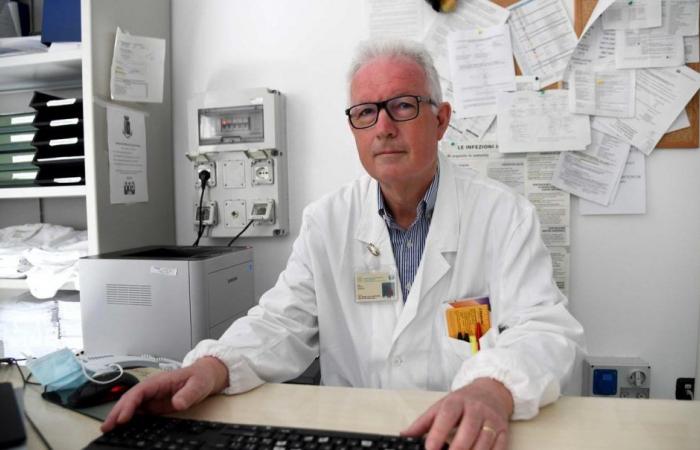Ferrara, 1 July 2024 – “The winter, did she see it?”asks Marco Libanoredirector of the Operational Unit of infectious diseases of the University Hospital of Ferrara, a unit at the top of the Italian ranking of clinical research centers in the study of fevers of unknown originThe structure is in the leading trio with Bologna e Trieste.
Marco Bibbiare, director of the Infectious Diseases Unit in Cona. The facility was awarded for the study of fevers of unknown origin
What does he mean?
“The climate is upset, the cold seasons have disappeared or in any case are reduced to a minimum. We are talking about a few days. We are faced with what we can define as a tropicalization of the climate. And the doctor must take this into account, broaden his diagnostic horizon even to that part of the world that is below the equator. Those who do our job are required to broaden their horizons, precisely to be able to intervene in time and therefore treat the patient.”
Changing climate, diseases appearing on the doorstep of Italy and our province. Like fevers, in fact. Precisely for this reason you were awarded, during the congress in Rimini, for the study of fevers of unknown origin (Fuo). Among the reasons, the constant commitment, the number of patients and the quality of the data collected. What fevers are we talking about?
“Fuo are those forms of hyperpyrexia that persist for at least three weeks and that cannot be explained after having carried out the main instrumental and laboratory diagnostic tests. They therefore require, in order to be defined and classified, a precise management path, also based on the use of sophisticated nuclear medicine investigations, such as tac-pet, or on innovative laboratory diagnostics such as polymerase chain reaction”.
Not just technology, how do you deal with it?
“Some of these fevers can be contracted in distant countries. The doctor should always ask the patient, when faced with such cases, if he has traveled and where. The areas are those of Africa and Central and South America. If the patient has been in those places, even a slight fever that persists should set off alarm bells.”
What to do?
“It would be wrong to perhaps administer a tachypirin while waiting for it to pass. We need to carry out checks”
The risks?
“There are quite a few. In some cases we are talking about arbovirosis, diseases that are transmitted by insects. There is a long list. Among these Chikungunya, DengueZika, West Nile. Tropical Dengue is contracted in some areas of Latin America, in the Carabini, in Cuba. There are now direct flights from Bologna and Venice to Cuba. Those who go to tropical beaches should not take a prolonged fever lightly”
West Nile?
“The first case was reported years ago, our province was affected immediately. We are talking about diseases that didn’t exist until a few years ago”
What effects can this ‘tropical’ climate have, the scorching temperatures for such prolonged periods?
“That these diseases no longer develop only in distant countries. One of the transmission factors is the tiger mosquito, which as we know is very present here. Outbreaks can also be created here, too.”
A bit like the Caribbean
“You said this. Of course, for years now we have been witnessing the tropicalization of the climate. The doctor must take this into account.”



